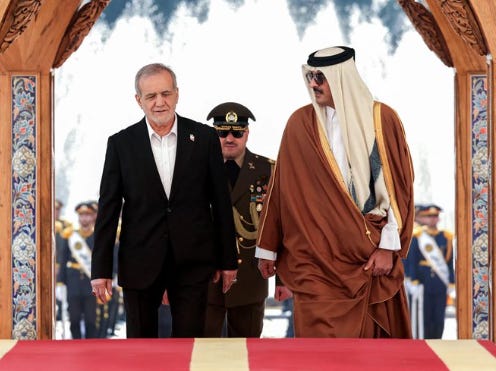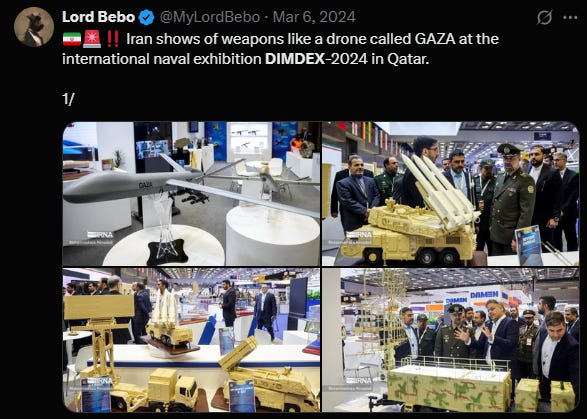Qatar and Iran: Strategic Partners in Proxy, Power, and Propaganda
Qatar and Iran coordinated ahead of Iran’s June 23, 2025 missile strike on Al Udeid Air Base, officials say, signaling a controversial and close relationship between the two governments
Qatar and Iran worked in concert ahead of Iran’s missile strike on Al Udeid Air Base in Qatar—the main U.S. military hub in the region—on June 23, 2025, according to sources familiar with the operation. Iranian officials provided advance warning to Qatari authorities, a move that underscores the unusually close and controversial relationship between the two governments.
This calculated coordination, conducted through discreet diplomatic channels, is the latest example of the enduring partnership between Doha and Tehran. Their alliance, often criticized for shared ideological leanings and mutual support for destabilizing regional networks, continues to raise concerns among Western observers.

Two Islamic Powers, One Global Mission: The Brotherhood and the Ayatollahs’ Shared Vision
The ideological underpinnings of the Qatar-Iran partnership are rooted in a shared ambition to export political Islam, despite the longstanding Sunni-Shia divide. Qatar’s support for the Muslim Brotherhood closely mirrors Iran’s revolutionary Shiite ideology; both regimes openly reject secularism and Western-style democracy in the Muslim world and actively seek to promote their own models abroad. Iran pursues its agenda through the “export of the Islamic Revolution,” while Qatar leverages the Brotherhood’s transnational network—tactics that often work in tandem to undermine Western influence. While Iran’s strategy is overtly militant, Qatar’s approach, sometimes referred to as “Civilization-Jihad,” is more subtle but no less concerning to Western analysts.
Qatar has emerged as the primary state sponsor of the Muslim Brotherhood, providing the group with financial, media, and diplomatic support. A 1991 memorandum uncovered by the FBI revealed the Brotherhood’s stated goal in North America: “The Ikhwan [Brotherhood] must understand that their work in America is a kind of grand Jihad in eliminating and destroying the Western civilization from within...” Qatar has reportedly financed around 126 Brotherhood-linked organizations across Europe, with documented payments totaling €72 million.
Iran, meanwhile, pursues its ideological export through a network of cultural centers, mosques, and educational institutions across Europe, all promoting the late Ayatollah Khomeini’s vision and recruiting support for Tehran’s regional agenda. Both countries see the global spread of political Islam as essential to their long-term strategies, forging an alliance that disregards traditional sectarian boundaries in favor of shared ambitions.
Supporting the Same Networks: From Hamas to Hezbollah, Regional Coordination
The close coordination between Qatar and Iran is perhaps most evident in their overlapping support for designated terrorist organizations. Qatar has transferred more than $1.8 billion to Hamas over the years, while the U.S. State Department estimates Iran has provided up to $100 million annually to the group. Qatar has also hosted senior Hamas leaders, including former political bureau chief Khaled Meshaal, since 2012.
Iran’s support for militant groups follows a different playbook but achieves similar results. The Islamic Revolutionary Guard Corps (IRGC) supplies military training, weapons, and intelligence to Hezbollah, which receives an estimated $700 million a year from Tehran. Recent conflicts have seen Iran’s IRGC, Hezbollah, and Hamas establish a joint military operations room in Beirut, while Hamas leadership continues to operate from Qatar—further evidence of the two countries’ willingness to enable destabilizing actors in the region.

Ties in Energy and Technology
Qatar and Iran’s economic entanglement is anchored by their joint ownership of the world’s third largest natural gas field—South Pars in Iran and North Dome in Qatar—creating deep mutual dependencies that insulate their alliance from political shifts. This shared resource has compelled ongoing technical cooperation, with Iran signing $17 billion in contracts to upgrade its portion and Qatar investing $10 billion in new liquefied natural gas production lines within the scope of their growing energy cooperation.
The partnership extends beyond energy, with both countries pledging in December 2024 to boost bilateral trade to $1 billion annually, up from $200 million. Plans include a 200-kilometer undersea power line linking their electricity grids, further binding the two regimes economically. Iranian firms have been tapped to consult on Qatari solar farm projects, and talks are underway for further collaboration with Iranian tech companies.

Ties in Education and Defense
Qatar and Iran have also deepened cooperation in education and defense. Agreements signed in 2022 established frameworks for university admissions, certificate recognition, and joint research initiatives, including faculty exchanges and technology partnerships. These collaborations, while ostensibly academic, have raised concerns about the transfer of sensitive technologies.
Qatar’s willingness to host sanctioned IRGC representatives at the 2024 Doha International Maritime Defense Exhibition (DIMDEX)- where Iran showcased missiles, drones, and submarines, including a drone named, “Gaza”- drew criticism from the U.S. State Department in 2022 and highlighted Doha’s disregard for Western concerns.
How Qatar Manages U.S. Partnerships While Maintaining Iranian Relations
Qatar’s strategy of hosting the largest U.S. military base in the Middle East while deepening ties with Iran is a prime example of hedging diplomacy. Al Udeid Air Base, home to roughly 10,000 American troops and the forward headquarters of U.S. Central Command, is vital for U.S. operations in the region. Yet Qatar maintains robust diplomatic and economic relations with Iran, as demonstrated by the advance warning provided before the recent Iranian missile strikes, as well as the fact that Qatar has stated that it would not allow U.S. forces to launch strikes against the Islamic Republic from the base.
This balancing act has allowed Qatar to position itself as an indispensable mediator between Washington and Tehran, amplifying its diplomatic influence. Doha has leveraged its unique relationships to broker regional conflicts and hostage negotiations, including the 2023 deal that saw the U.S. unfreeze $6 billion in Iranian funds in exchange for American detainees. Qatari officials claim to be “working on de-escalation,” but critics argue that Doha’s actions often serve to shield Iran from Western pressure.



